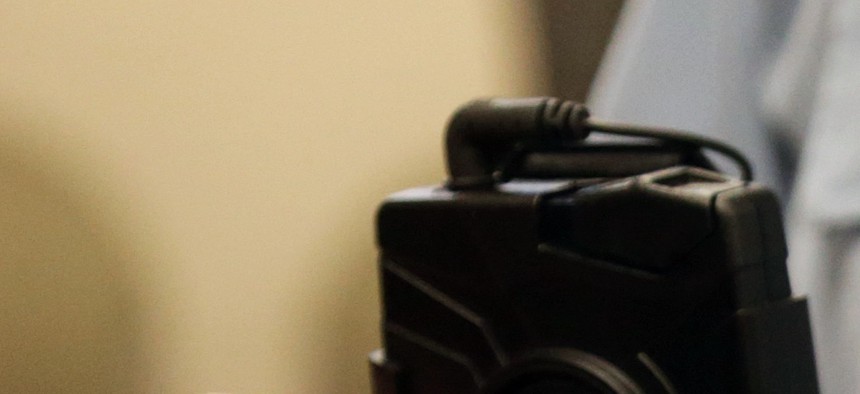Connecting state and local government leaders
Money from Obama’s funding pledge helps, but it only goes so far if police departments are reluctant to adopt the new technology.
President Obama on Monday answered a call from Michael Brown's family to "ensure that every police officer working the streets in this country wears a body camera."
Realizing that dream, however, won't be easy. Obama's plan, if it can earn congressional approval, would help pay for up to 50,000 body cameras nationwide—almost doubling the number currently deployed—by doling out $75 million in matching funds to local and state police departments over three years, to cover purchasing costs up to 50 percent.
But it's not just about money. A number of local police departments remain hesitant—if not downright skeptical—about body cameras, despite growing public demand and research that suggests positive benefits.
"At this juncture, it doesn't change anything," said Mike Puetz, a spokesman for the St. Petersburg Police Department in Florida, when asked about Obama's funding pledge. "From our perspective, and I think for most agencies, we're looking at the technology and looking at how it works in the real world regardless of who pays the bill."
St. Petersburg acquired its first body camera last month, Puetz said, and plans to begin testing the technology in January, a pilot program that is expected to take at least several months and was propelled in part by the events in Ferguson.
Puetz said his police chief is open to body cameras but currently favors dashboard cameras because that technology "doesn't have some of the obstacles," such as privacy concerns, questions about data storage, and whether victims or witnesses to a crime may be less willing to talk to an officer wearing a camera.
"Each agency wants to take a look at them and take a look at how they work in their particular community and go from there," Puetz said. "You can't just give a camera to someone and say, 'Here, go wear it.' "
St. Petersburg's trepidation is not unusual. Although body cameras have become increasingly popular among law enforcement agencies in recent years, the decision to adopt them is generally made solely by local police chiefs. While some have embraced the technology as a new frontier that can bolster transparency and trust in their communities, others remain less convinced.
Additionally, many national police organizations have refrained from outwardly urging the use of body cameras.
"Like any new technology, we really caution that before police agencies just jump in and start using them, to sit down and think about all the issues that they raise," said Lindsay Miller, a senior research associate at the Police Executive Research Forum, which has developed guidelines for body cameras but has not endorsed their implementation. "There are a lot of things that need to be considered, and that's why we advise agencies to do pilot testing."
Privacy groups are also wary that widespread use of body cameras could open up a Pandora's box of unintended consequences, such as the use of facial recognition, though the groups are generally supportive of the technology—as long as agencies tread carefully.
"It's pretty vital that [body cameras] become accompanied by good policies and procedures so they don't become another avenue of surveillance or a means where people find humiliating video of them on YouTube," said Jay Stanley, a senior policy analyst at the American Civil Liberties Union, who authored a report on police body-mounted cameras last year.
Despite potential hurdles, Stanley cheered Obama's funding proposal as a "further boost to and validation of a technology that is already taking off."
The reticence from law enforcement remains despite early investigations into the impact of body cameras that have been generally promising. A study conducted by Cambridge University in 2012 and 2013 examined the effect of body cameras when the full local police force in Rialto, Calif., began using them. In the first year of the technology's introduction, use of force by officers fell 60 percent, while citizen complaints against police plunged 88 percent.
"Law-enforcement folks are the most skeptical buyers in the world," said Steve Tuttle, a spokesman for Taser, which produces cameras. But the events in Ferguson and a general growing awareness has begun to change that, he added. "A year ago that were saying, 'Hell no,' but are now calling us back."
Taser has manufactured and sold more than 30,000 units to some 1,200 police departments since 2009 (and has seen its surging stock nearly double since Brown's death in August). Vievu, another manufacturer, has sold about 40,000 cameras to about 3,900 agencies. Several major cities—including Oakland, Los Angeles, and Washington, D.C.—have either begun using cameras or are testing them. Both companies now offer cameras that cost a few hundred dollars, as well as cloud-based storage systems that can hold recordings, for a monthly fee.
The potential infusion of cash from the federal government won't make police body cameras universal overnight, but advocates say it will help move the needle and raise recognition of the technology's benefits for good policing practices.
"We're at the tip of the iceberg," Tuttle said. "It took us a decade to get significant market penetration with [our stun guns]."
NEXT STORY: Louisville debuts mobile-first website




